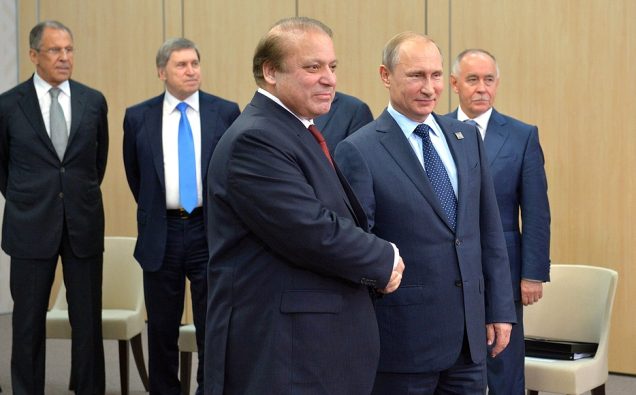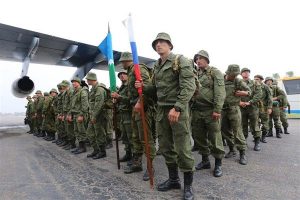
The arrival of a contingent of Russian troops led by Chief of General Staff ,in Islamabad this week for joint military exercises in highlands of northern Pakistan has much significance for the both the countries and the volatile region.
In the past the two did not enjoy cordial relations over the last seven decades despite having geographical proximity and some cooperative ties.
During two-week stay in Pakistan, Russian troops will participate in counterterrorism drills with an objective to cooperate in combating terrorist attacks in high altitude areas.
The planned exercise is being seen as a demonstration of the desire for closer defense ties between Pakistan and Russia after they signed a military cooperation pact in 2014. According to military analysts, this is an attempt to create a balance in the region.
But first let’s have a brief look at how the two countries diverged in the past.
Historically, ties between Pakistan and Soviet Union (Russian Federation) experienced few ups and more downs during different periods. The two countries established the diplomatic and bilateral relations on May 1, 1948. It was the Soviet leaders, not the Americans, who invited Prime Minister Liaquat Ali of the newly born state to visit their country. But the Pakistani leader preferred to visit Washington in 1950 a development which signaled the young state’s foreign policy priority, and shaped its future course.
Later, Pakistan joined US led alliances under CENTO and SEATO pacts in a bid to support the Western campaign to contain communism in the Middle East and South East Asia. This further soured ties between Soviet Union and Pakistan. On the other hand , Indian Prime Minister Jawaharlal Nehru-led India drifted towards Soviet Union, leading to decades long partnership between the two countries. During this period, Pakistan even provided Badha Ber Air strip near Peshawar to USA for espionage activities. A U-2 plane flown from this airport was shot down over Soviet Union in 1961, leading to fears to Soviet reprisal attack on Pakistan.
During the 1965 war, Soviets provided robust support to India whereas Americans imposed an embargo on spare parts.
The Indo-Soviet Defense Pact signed before the Civil war in East Pakistan in 1970 , gave a boost to defense capabilities of New Delhi. During 1971 war, Soviet Union lent all the military and diplomatic support to India. It was during the period of Prime Minister Zulfikar Ali Bhutto that Pakistan extended a hand of friendship to Moscow and an agreement for the establishment of Pakistan Steel Mill was signed. This was the major investment by the Soviet Union in Pakistan. But this phase of friendship could not last long and Soviet-backed government was formed in Kabul and later Soviets invaded Afghanistan in December 1979.
As the regional scenario changed, Pakistan’s military leadership preferred to join the US-led Western camp. During the war launched against the Soviet Occupation of Afghanistan, Pakistan acted like a front line state. Pakistan’s leadership might have reaped the benefits of West’s financial and military support but the situation sowed the seeds of religious extremism and militancy.
After the withdrawal of Soviet forces from Afghanistan in late 80s, there was a vacuum in Afghanistan and a civil war ensued. In 1991, there was a breakdown of Soviet Union and about a two dozen new countries became independent. But Russian Federation was still very strong. By the middle of the 1990s, the Taliban were able to capture Afghanistan and their government was established. This government was supported by Pakistan and some Middle Eastern countries. Russian Federation, Iran and India supported the northern alliance or non-Pashtun ethnic groups of northern provinces of Afghanistan. In 1997, the then Prime Minister Nawaz Sharif visited Moscow with an objective to remove irritants in Russo-Pakistan relations. But this all could not stay for long. There was a military coup in Pakistan in 1999.
Then, the terrorist attacks in New York and other in September 2001 changed the world altogether for the region. Pakistan obviously re-emerged as one of the closest American allies.
In the current scenario, mending fences by Russia and Pakistan, speaks volumes about the two countries desire to explore new partnerships.
Moscow has recently announced to construct a gas line from Lahore to Karachi to help Pakistan overcome energy crisis.
Regionally, New Delhi would find it troubling that Moscow forges closer ties with Islamabad.
Clearly, Moscow is also conscious of the growing US-India relations and wants to have more options at its disposal to maintin its influence in the region. At a time, when India is creating a war hysteria in South Asia after an attack on a military camp in the Indian held Kashmir, the improved Russo-Pakistan relations have a profound message:
“That Moscow ignored Indian pique at the very thought of the Russian — read former Soviet — military hobnobbing with its Pakistani counterpart shows Moscow’s wish to reciprocate Islamabad’s quest for a better relationship with a country with which it has had a long, egregious association,” Pakistan’s Dawn newspaper noted in an editorial.
Russia is also seeking to expand it influence in Afghanistan, and in this respect Pakistan’s role is seen as vital.
The future looks full of possibilities with three major factors likely to shape its future – the US-India relationship, China’s role in economic and security areas with Pakistan and Russia’s relations with Pakistan, which ultimately, and perhaps, sooner, may affect Moscow’s ties with India.















